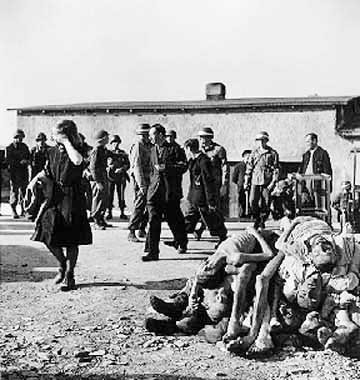Buchenwald

German civilians from Weimar brought to see Buchenwald - April 1945
Watching and hearing (on TV) Chancellor Markel, President Obama and Elie Wiesel at Buchenwald today, �June 2, 2009, reminded me of my own visit to that place of infamy in the early 1990s. The occasion was a meeting of anthroposophical organization development consultants in Weimar, Germany. The Berlin Wall had cracked only two years previously and Weimar was chosen because it was in the east, the ex-�German Democratic Republic�, and our German hosts had chosen Weimar because it is the cradle, so to speak, of German culture � the city of Goethe and Schiller.
Our group consisted of people of many nationalities, and most of us weren�t even aware that the Buchenwald concentration camp was located nearby, in fact only three kilometers from Weimar, until we read on the program that we were scheduled for a visit. It was as though the Nazis had wanted to defile the giants of the German spirit. We toured the camp, saw the barracks and the ovens and the photographs and listened to the guide�s description. She was a young Polish woman who spoke German with a slight accent. What remains most vividly in my memory, however, are the German officers� homes just outside the camp: nicely landscaped suburban houses where they went after �work� at the camp to sleep with their wives or play with their children, or perhaps attend a concert in Weimar, thus living out the banality of evil; and the busload of overfed Bavarian tourists who arrived at about the same time as us, toured with us and listened gravely to the Polish guide�s talk. Many of them left in tears. They were a different generation of Germans of course, but I had the impression that the reality of the holocaust hadn�t really hit them � or me � until that day at Buchenwald.
Click here for the texts and video of Markel�s, Obama�s and Wiesel�s moving words on that day.
���������
�
